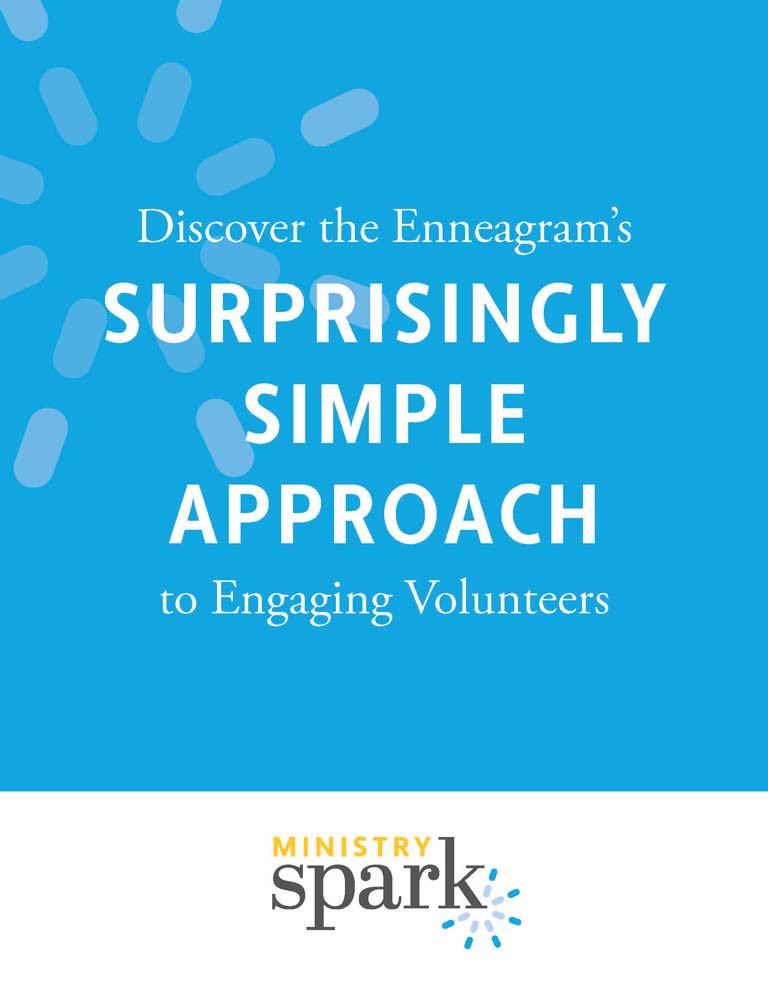< Back to The Reformer (Enneagram One) article.
As ministry leaders, we are not exempt from the mistake of thinking that everyone looks at life the same way we do. We assume the volunteers we lead have similar needs and are driven by the same desires.
This sometimes makes it hard for us as ministry leaders to understand the unique motivations, concerns, and styles of the staff and volunteers we serve.

On the surface, the Enneagram looks like any other personality test. It features nine distinct ways of looking at the world. But, the results of the Enneagram also examine the unique ways that each type of personality responds to living in this broken and often confusing world.
Twos are empaths who almost always seem to recognize the needs of others before anyone else. When they notice an opportunity to be of service, they’ll immediately roll up their sleeves and get to work.
The Enneagram doesn’t just describe a person’s personality traits, it helps us understand what motivates him or her. As ministry leaders, it encourages us to be mindful of our perspectives—and perspectives of our teams—in a way that can help us:
- Identify the strengths and challenges of the individuals on our teams
- Create harmony and operate more effectively
- Maximize everyone’s contribution
- Inspire team members with guidance that empowers and invigorates
This series of Enneagram articles will improve your ability to lead and manage your staff and volunteers. If you’re unsure about your Enneagram type or want to give the test to your volunteers and staff members, you can take a free online assessment like the one at YourEnneagramCoach.com.
How to Use These Articles
This series of articles examine each of the nine Enneagram types, and includes the following elements:
- Attributes: Three adjectives that describe each type.
- Driving motivation: This section helps you understand what desires and fears drive a specific type’s behavior.
- Key verse: Each personality type has a verse with a helpful reminder to turn their attention to God.
- About the type: This is a brief overview of each type.
- Leading as your type: Each personality has unique strengths as a leader. Here we examine those strengths and offer some suggestions for overcoming the corresponding weaknesses.
- Motivating each type: For example, if you’re a Type Eight trying to understand how to motivate a Four, this section will help.
These resources will develop your skills as a leader and manager and enable you to develop a strong team.
Type 2: The Helper
Attributes: Generous, Service-oriented, Pleasing
Driving motivation: To be caring and serving others
Key verse: “So do not fear, for I am with you; do not be dismayed, for I am your God. I will strengthen you and help you; I will uphold you with my righteous right hand” (Isaiah 41:10, NIV).
About Twos:
Twos are empaths who almost always seem to recognize the needs of others before anyone else. When they notice an opportunity to be of service, they’ll immediately roll up their sleeves and get to work.
While Twos are always genuine with concern and care, it’s easy for them to find their identity in being needed. This means that the generous nature of Twos is often tainted by self-interest.
People are naturally drawn to Twos. Their kindness and genuine goodness are refreshing, and it’s obvious that making others happy is what makes them happy. Twos put church, ministry, and people first, which makes them an incredible asset.

But it’s critical to recognize that some of that behavior is driven by a desire to feel valuable. All they really desire from others is recognition and appreciation for their effort. It can be excruciating on Twos when they do good work but are either unappreciated or unseen.
They devote a lot of energy to maintaining relationships and go out of their way to make others feel welcomed and loved, often at their own expense.
Leading as a Two:
Twos can make exceptional leaders. You tend to heap support, guidance, and attention on those in your circle of influence. This can help to create a real bond with the folks you lead.
But Twos will often go out of their way to avoid giving difficult or critical feedback. So disciplining others, giving them bad news, or rejecting others’ work is rough for you.
For some personality types, a Two’s management style can feel smothering. For those who thrive with a certain amount of autonomy, a constant need to check in and help out can come across as overbearing.
This is an excellent example of the Two’s tendency to use others to fill their emotional tanks. As a Two, put your empathetic nature to work discerning what the people you lead need most—and be there to rescue them when asked.
Twos need to be wise about setting boundaries. Without them, it’s easy for others to take advantage of your generous nature. It doesn’t take too long before volunteers and staff members discover how easy it is to get you to do their work.
Motivating a Two:
Twos are incredibly easy to manage because they want to be supportive and helpful to authority figures. But this can be a problem when you need critical feedback. Twos will often soft-pedal negative feedback or use flattery to make you happy.
It’s critical that you find ways to acknowledge and communicate your appreciation for the Two’s efforts. Twos run on thanks. If a Two feels unappreciated, they struggle to maintain momentum, but they become energized when their sacrifice is recognized.
In addition, take note that you don’t become too reliant on the Two. It’s easy to fall back on their kind nature whenever you need something done because they always deliver.

In the end, you’ll burn them out, make them resentful of you, and steal opportunities from others to deliver good work.
Twos make wonderful ambassadors for your ministry or church and shine when they can make connections with others.
Their tendency to make people feel valued makes them ideal in children’s and youth ministry—as long as you don’t put them in a position where they’re expected to keep order.
Building Better Teams
People operate best when they’re plugged into roles where they fit to suit their strengths. A lot of the ministry struggles churches experience come from filling vacancies with whoever is available.
Hopefully, the Enneagram will help you better understand your unique management style—and how you can position people according to their strengths. Because teams that fit together well can help churches thrive!
Valuing the various personalities in our churches empowers us to do better ministry. Once we understand the rich diversity of our churches we are able to:
- Appreciate the balance that comes from our various strengths
- Quit struggling to copy the leadership styles of others and lead from our own strengths
- Organize our teams so that everyone gets an opportunity to do great work
- Abandon a one-size-fits-all approach to encouragement and empowerment
Go to The Achiever (Enneagram Three) article. >
Discover this Series:
- How to Lead Volunteers: The Reformer (Enneagram One)
- How to Lead Volunteers: The Achiever (Enneagram Three)
- How to Lead Volunteers: The Individualist (Enneagram Four)
- How to Lead Volunteers: The Investigator (Enneagram Five)
- How to Lead Volunteers: The Loyalist (Enneagram Six)
- How to Lead Volunteers: The Enthusiast (Enneagram Seven)
- How to Lead Volunteers: The Challenger (Enneagram Eight)
- How to Lead Volunteers: The Peacemaker (Enneagram Nine)
- Download the full guide here!

Discover the Enneagram’s Surprisingly Simple Approach to Engaging Volunteers

Discover the Enneagram’s Surprisingly Simple Approach to Engaging Volunteers












